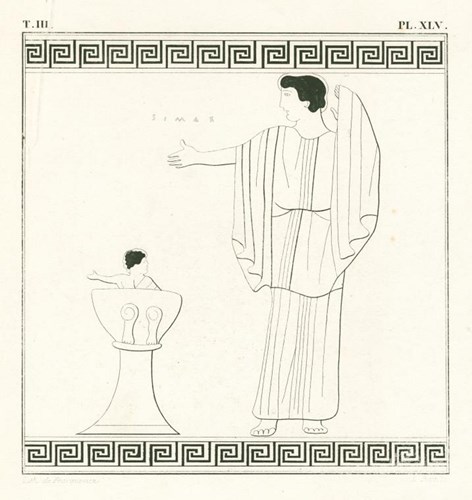Demophon
Demophon was the youngest child of King Celeus of Eleusis and Metaneira. He had a brother (Triptolemus) and four sisters (Kallithoe, Kallidike, Demo, and Kleisidike). He is an obscure figure and never appeared in inscriptions or art from Eleusis, but he plays a pivotal role in the Homeric Hymn to Demeter. When the goddess came to Eleusis, Metaneira invited her to the palace as a nursemaid for the young prince. The divine ministration worked miracles. Demophon grew without eating grain or sucking from the breast. Demeter anointed him with ambrosia and breathed down “her sweet breath on him as she held him to her bosom”. At night she buried him within the fire as if he were “a smouldering log” to purge his mortal nature. His parents were completely unaware of this ritual but wondered at his miraculous growth and appearance that resembled a god. Surprisingly, the Hymn does not reveal the reason for Demeter’s decision to make Demophon immortal.
One night, Queen Metaneira left her fragrant bedchamber and tried to spy upon her mysterious guest. When she saw Demeter making her child disappear in a mass of flames, she struck her thighs and screamed in horror. The goddess was furious at the careless woman who interrupted the ritual. She removed Demophon from the fire and placed him on the ground. She accused Metaneira of being unable to recognise the difference between future good and bad fortune. In her heedlessness, she condemned her little boy to death and doom rather than the immortality and agelessness that Demeter would have granted him. Metaneira remained speechless, but Demophon began wailing. His sisters came to his rescue. They picked him up and tried to comfort him, but it was all in vain because “he was now being held by nursemaids who were far inferior”.

Demeter and Demophon, Louis Petit, ca. 1844 - 1861, engraving, The New York Public Library © The Miriam and Ira D. Wallach Division of Art, Prints and Photographs: Picture Collection, The New York Public Library
There is some ambivalence as to Demophon’s eventual fate. In some versions of the myth, the child perished that night in the fire. Other stories argue that Demeter allowed Demophon to reach the threshold of youth. In any case, since immortality was out of the question, Demophon eventually died. But Demeter kept the promise she made on that fateful night and gave him unwitting honour. Every year, at the appropriate time, the sons of the Eleusinians held “a war, a terrible battle among each other” for “all days to come”. This semi-athletic festival was called ballêtus and attempted to compensate for the loss of Demophon. Since Demeter had failed to immortalise the mortal prince, she tried to mitigate death by another route. Thus Demophon earned a hero cult and became a symbolic first initiate who was nursed in the boson of the goddess.





